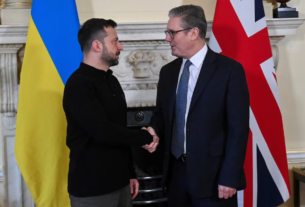A controversial figure linked to al-Qaeda appeared at the World Economic Forum (WEF) in Davos, sparking outrage and raising questions about the event’s ethical stance. The speaker, an official from Hayat Tahrir al-Sham (HTS), a group with historical ties to al-Qaeda, was invited to address global leaders, business magnates, and policymakers. His presence at such a prestigious event has led to strong criticism, with many questioning whether the WEF should reassess the individuals it chooses to give a platform.
HTS, considered a terrorist organization by the United States and many Western nations, has been involved in violent acts throughout the Syrian civil war. The group has long been associated with al-Qaeda, sharing ideologies that endorse violent extremism. The appearance of a figure linked to this organization at a significant international forum such as the WEF has raised serious concerns about the event’s responsibility to uphold global peace and security.
Critics argue that inviting individuals with connections to violent groups to speak at the WEF contradicts the event’s mission of promoting cooperation and stability. The WEF has long been a platform for discussing global economic and social issues, and its credibility relies on the values it represents. By allowing someone with ties to terrorism to speak, the forum risks legitimizing extremist views and undermining its commitment to peaceful dialogue and conflict resolution.
The decision to feature an al-Qaeda-linked speaker at the WEF has been met with backlash from various political leaders and human rights organizations. Many have expressed their outrage, claiming that such an invitation normalizes extremism and encourages violent ideologies. “A platform like Davos should not be used to legitimize terrorists and their destructive agendas,” one critic said, emphasizing the need for the forum to take a firm stance against violence.
Supporters of the WEF’s decision argue that dialogue, even with controversial figures, is necessary to address global issues such as the ongoing conflict in Syria. They claim that engaging with groups like HTS might help open pathways to peace or provide insight into resolving complex situations. While this perspective seeks to prioritize diplomatic discussions, it raises ethical concerns about whether extremist figures should be given a platform in the first place.
The debate about the WEF’s invitation policy touches on a broader issue international forums face: how to engage with controversial individuals without endorsing their views. Some believe conversing with such figures might help address underlying problems and foster peace efforts. Others contend that by inviting individuals with ties to terrorism, global events risk emboldening violent movements and sending the wrong message to the international community.
This controversy has highlighted global organizations’ ongoing dilemma when balancing free speech with ethical responsibility. While discussions on critical global topics often require a range of perspectives, not all voices deserve to be heard on international stages. As a respected institution, WEF finds itself at a crossroads in maintaining its credibility without compromising its core values of peace and security.
As the debate continues, the question remains whether the WEF will reconsider its invitation process to prevent future incidents that could damage its reputation. Some critics argue that the forum should prioritize the integrity of its discussions by only allowing individuals who adhere to internationally recognized norms of peace and stability. The WEF’s decision moving forward could have significant implications for its role in global diplomacy and its standing among world leaders.
The controversy surrounding the appearance of the al-Qaeda-linked figure at Davos underscores the complex ethical challenges international organizations face in the modern world. As the WEF seeks to balance openness with accountability, it must carefully weigh the risks of providing a platform to individuals who may threaten global peace. How the WEF handles this situation could set a precedent for future global gatherings and shape the ethical standards of international diplomacy.




